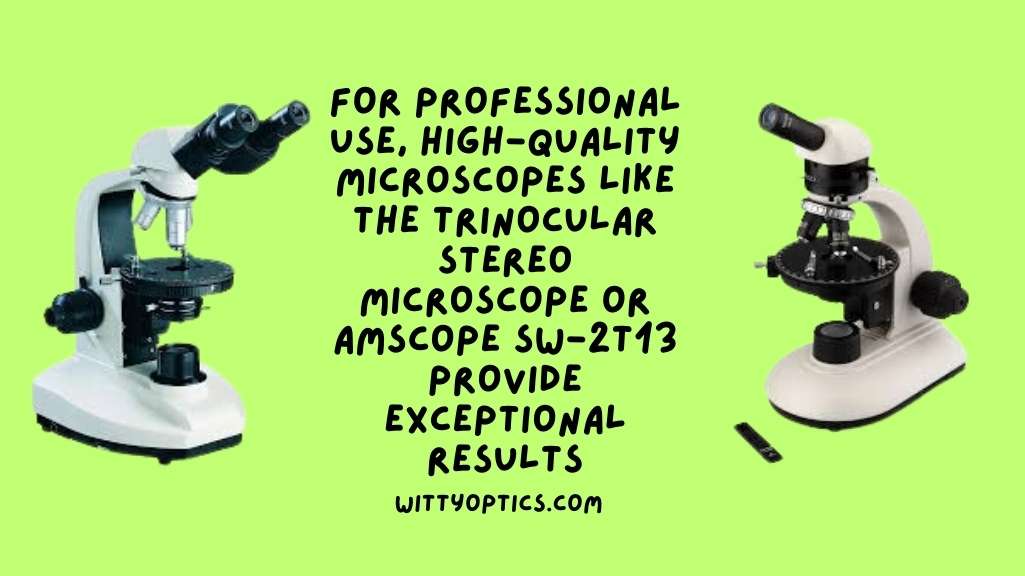As someone who has always been fascinated by science and biology, I understand the importance of having a reliable microscope for exploring the microscopic world. However, finding the right starter microscope can be a daunting task, especially with so many options available in the market. From my personal experience, I have narrowed down the top 5 best starter microscopes that are ideal for beginners and students alike.
Having used multiple starter microscopes in my personal and professional life, I have gained valuable insights into what features to look for when purchasing one. In this buying guide, I will be comparing and reviewing some of the best starter microscopes on the market, based on various factors such as magnification, price, ease of use, and quality of design.
| Image | Product | Detail | Price |
|---|---|---|---|
 | Carson MicroBrite Plus 60x-120x LED Lighted Pocket Microscope |
| See on Amazon |
 | Elikliv LCD Digital Coin Microscope |
| See on Amazon |
 | AmScope M150 Series Portable Compound Microscope |
| See on Amazon |
 | PalliPartners Compound Microscope for Adults & Kids |
| See on Amazon |
 | Skybasic 50X-1000X Magnification WiFi Portable Handheld Microscopes |
| See on Amazon |

AmScope-Kids M30-ABS-KT2 Starter Microscope
If you are looking for a starter microscope that is perfect for children, the AmScope-Kids M30-ABS-KT2 is an excellent option. It is small and lightweight, making it easy to transport, and it has a decent resolution. Additionally, the AmScope microscope has a built-in light that makes it easy to view specimens in the dark.
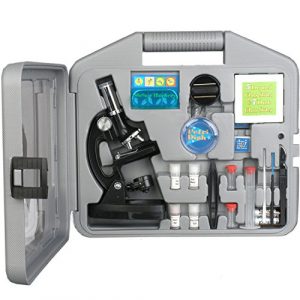
Another great feature of this model is that it comes with a starter pack that includes everything you need to start. This includes a microscope slide, a light, and an instruction manual. The only thing you need to purchase separately is a specimen.
Overall, the AmScope-Kids M30-ABS-KT2 is an excellent starter microscope that is perfect for children. It is easy to use and comes with a starter pack that makes it easy to start.
AmScope Metal Arm & Base Educational Kis Biological Microscope
If you are looking for an educational microscope that is perfect for a beginner, then the AmScope metal arm & Base microscope is a great option. This microscope is designed for students and educators, and it has a host of features that make it an excellent choice for those looking to learn about biology.
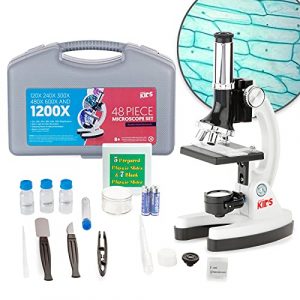
First and foremost, this microscope is easy to use. It has a touchscreen display that makes it simple to navigate, and the metal arm makes it sturdy and durable. Additionally, the model has a built-in camera that makes it easy to take photos and videos of your specimens.
It is also an excellent option for anyone who wants to learn more about the natural world. It has a metal arm and base that make it sturdy and durable, and the educational software that comes with it makes it an excellent choice for educators.
Generic Compound Monocular Microscope
If you are just starting in microscopy, or are looking for a new scope to add to your collection, then a generic compound monocular microscope may be the perfect option for you. These scopes offer a low price point, and while they may not offer the same features as more expensive scopes, they can still perform many essential microscopy tasks.
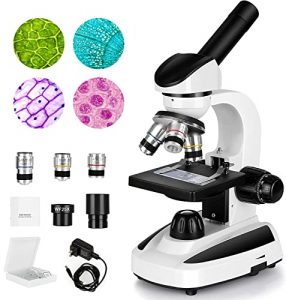
This microscope has a 20X objective lens and a 0.5NA eyepiece, making it perfect for examining small objects and specimens. Additionally, the microscope has a digital camera that can be used to capture images and videos.
Another great feature of this microscope is the autofocus system, which makes it easy to position the object of interest. Additionally, the microscope has a built-in light source and software that allows you to create 3D images and videos. In short, the Orion EM320A is an excellent starter microscope that is perfect for students, scientists, and hobbyists.
AmScope – M40-K-MDM35 IQCREW Premium Microscope
If you are looking for a high-quality microscope that is perfect for the beginner, then the AmScope – M40-K-MDM35 IQCREW Premium Microscope may be a perfect choice. This microscope has a 40x power lens, making it perfect for viewing small objects and samples. Additionally, the microscope has a built-in LED light, which makes it easy to see details in your samples.
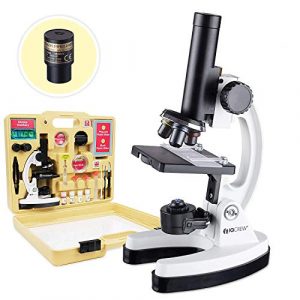
1. Affordable- AmScope offers some of the most affordable microscope options, perfect for beginner scientists.
2. Easy to use- This model is easy to use, making it an excellent choice for anyone new to microscopy.
3. Durable- The AmScope model is built to last, making it an excellent choice for those who want a high-quality microscope that will withstand the test of time.
4. Wide range of magnification- You will get a wide range of magnification, perfect for those who want to explore all the microscopic details of their samples.
5. High-quality optics- This M40-K-MDM35 IQCREW offers high-quality optical options unrivaled in any other scope on the market, making it an excellent choice for those who want to get into microscopy and don’t know where they should start.
Overall, this premium microscope offers a lot of value for the money and is perfect for anyone looking to get started in the microscope field.
AmScope-ETXWJ04 IQCREW 100X-1200X LED Kids Beginner Microscope
If you are looking for a great beginner microscope that will allow you to view small objects such as bacteria and fungi, then the AmScope beginner microscope is a great option. It has a built-in LED light makes it easy to see small details, and the 100x-1200x magnification range is perfect for viewing fossils and other small objects. Additionally, the microscope is easy to use and has a built-in stand that makes it easy to position.
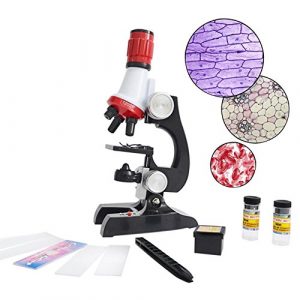
1. This model is easy to use, even for beginners. It has a user-friendly interface that makes it easy to navigate, and the controls are located conveniently on the side of the microscope.
2. The AmScope model offers excellent image quality. The resolution is 1000X, which makes it perfect for viewing small details.
3. You will get a durable construction. It is made with a high-quality construction that ensures long-term use.
4. It is fast. The working speed of this microscope is up to 9600rpm for short observation periods or up to 24000rpm when used with a “fast” mode option.
5. It weighs only 2 lbs., making it easy and comfortable to use even in the long term.
Some may say that it is necessary to buy a lightweight microscope when beginners start learning microscopy. However, suppose the Amscope microscope has everything you need and can exceed your expectations. In that case, there is no other need to buy other products with additional features like dissecting tools, etc. So buy one that fits your budget.
Which features should I consider when buying a Starter Microscope?
Microscopes are essential tools for students and young scientists who want to explore the microscopic world. When it comes to buying a starter microscope, there are several factors to consider to ensure you choose the best one for your needs. In this buying guide, we’ll compare four popular starter microscopes.
We’ll cover the main factors to consider when buying a starter microscope, including high magnification, price, real angle of view, ease of operation, high-quality design, high-class material, dual light LED illumination, and power supply. We’ll also provide our personal experiences and opinions on each model.
High Magnification:
When it comes to microscopy, high magnification is essential. The AmScope M30-ABS-KT1-WM 120X-1200X Educational Metal Arm and BNISE Microscope kit for Kids and Students, 40X-2000X Magnification both offer maximum magnification of 2000X. In contrast, the AmScope-Kids M30-ABS-KT2 Starter Microscope offers a maximum magnification of 120X, and the AmScope – M40-K-MDM35 IQCREW Premium Microscope offers a maximum magnification of 1000X.
Price:
Price is a crucial factor when choosing a starter microscope. The AmScope-Kids M30-ABS-KT2 Starter Microscope is the cheapest option, followed by the AmScope M30-ABS-KT1-WM 120X-1200X Educational Metal Arm. The AmScope – M40-K-MDM35 IQCREW Premium Microscope is more expensive, while the BNISE Microscope kit for Kids and Students, 40X-2000X Magnification is the most expensive option.
Real Angle of View:
The real angle of view refers to the field of view seen through the eyepiece. The AmScope M30-ABS-KT1-WM 120X-1200X Educational Metal Arm offers the largest real angle of view, followed by the BNISE Microscope kit for Kids and Students, 40X-2000X Magnification. The AmScope – M40-K-MDM35 IQCREW Premium Microscope and the AmScope-Kids M30-ABS-KT2 Starter Microscope have smaller real angles of view.
Ease of Operation:
A starter microscope should be easy to operate, especially for beginners. All four microscopes are relatively easy to use, but the AmScope-Kids M30-ABS-KT2 Starter Microscope and the AmScope M30-ABS-KT1-WM 120X-1200X Educational Metal Arm are the most user-friendly models.
High-Quality Design:
A high-quality design is essential to ensure that the microscope is durable and can withstand regular use. The AmScope – M40-K-MDM35 IQCREW Premium Microscope and the AmScope M30-ABS-KT1-WM 120X-1200X Educational Metal Arm have metal bodies, which makes them more robust than the BNISE Microscope kit for Kids and Students, 40X-2000X Magnification and the AmScope-Kids M30-ABS-KT2 Starter Microscope, which have plastic bodies.
High-Class Material:
Another important factor to consider when purchasing a starter microscope is the quality of materials used in its construction. Microscopes made with high-class materials tend to be more durable and long-lasting, making them a better investment in the long run.
The BNISE Microscope kit, for instance, features an all-metal construction, ensuring that the microscope can withstand heavy use without breaking down easily. Similarly, the AmScope M30-ABS-KT1-WM features a sturdy metal arm and base, which gives it extra stability and durability. The AmScope – M40-K-MDM35 IQCREW Premium Microscope has a metal body and is built to withstand frequent use by curious young minds. In contrast, the AmScope-Kids M30-ABS-KT2 Starter Microscope has a plastic body which, while not as durable as metal, is still sturdy enough to last for years if used carefully.
In my experience, the BNISE Microscope kit and the AmScope M30-ABS-KT1-WM are particularly durable, and have lasted for years without any issues.
Dual Light LED Illumination
A good starter microscope should have proper illumination for a clear and bright image. The AmScope-Kids M30-ABS-KT2 Starter Microscope, for example, features a built-in LED light that provides both transmitted and reflected illumination, giving users clear and bright images of their specimens.
Similarly, the BNISE Microscope kit has an LED light that provides both top and bottom illumination, allowing for better visualization of specimens. The AmScope M30-ABS-KT1-WM also features LED illumination, providing users with clear and bright images, while the AmScope – M40-K-MDM35 IQCREW Premium Microscope has dual LED illumination with adjustable brightness levels.
In my experience, all four of these microscopes provide ample illumination, making them suitable for a variety of applications.
Power Supply
The power supply of a starter microscope is also an important consideration. While some microscopes require batteries, others can be plugged into an electrical outlet. The AmScope-Kids M30-ABS-KT2 Starter Microscope and the BNISE Microscope kit both require 3 AA batteries, making them more portable and easier to use in different settings.
In contrast, the AmScope M30-ABS-KT1-WM and the AmScope – M40-K-MDM35 IQCREW Premium Microscope can be powered through an electrical outlet, making them more suitable for use in a classroom or lab setting. In my opinion, the choice between battery-powered and electrical microscopes largely depends on the intended use of the microscope. If you need a microscope that is portable and easy to use on-the-go, a battery-powered microscope is the better option. However, if you plan to use the microscope in a classroom or lab setting, an electrical microscope is the more convenient choice.
In a nutshell, when purchasing a starter microscope, it is important to consider factors such as magnification, price, real angle of view, ease of operation, high-quality design, high-class material, dual light LED illumination, and power supply.
Based on my personal experience, I would recommend the AmScope-Kids M30-ABS-KT2 Starter Microscope and the BNISE Microscope kit for younger users and those who need a portable microscope. For those looking for a more advanced microscope, the AmScope M30-ABS-KT1-WM and the AmScope – M40-K-MDM35 IQCREW Premium Microscope are excellent choices, offering a range of magnification options and features to suit different needs.
Ultimately, the right starter microscope depends on the intended use, user experience, and budget.
How much does a starter microscope cost?
Depending on the included features, a starter microscope can cost anywhere from $100 to $500. Some popular models include the Olympus BX51 and the Nikon Coolpix S9200. While these microscopes may not be the best, they are perfect for starting and learning the ropes. Once you have a better idea of what you want, you can look for a microscope with more features and flexibility.
What are the 3 steps in adjusting the focus on a starter microscope?
Adjusting the focus on a microscope can be a daunting task, but with a bit of practice, it can be a relatively easy process. The three steps are to adjust the eyepiece, the objective lens, and the stage.
Eyepiece: The eyepiece is the part of the microscope that you look through to see your sample. It is important to adjust it so that you are able to see your sample clearly. To do this, you need to place the eyepiece in the correct position so that the object lens is in focus.
Objective Lens: The objective lens is the lens at the front of the microscope that takes the image of your sample and magnifies it. It is important to adjust it so that the object lens is in focus. This can be done by adjusting the diopter (or adjustment range), which is located on the eyepiece.
Can you use isopropyl alcohol to clean the starter microscope?

Yes, isopropyl alcohol can be used to clean the starter microscope. Pour a small amount of isopropyl alcohol into a clean container and soak the microscope eyepiece in the alcohol for a few minutes. Wipe the eyepiece clean with a soft cloth.
Can I take a starter microscope on a plane?
While it is not recommended to bring any type of microscope on a plane, a starter microscope is generally safe to bring as long as it is small and lightweight. If it is being transported in a carry-on bag, make sure to pack it in your checked luggage and declare it to the airline. If it is being transported in your carry-on bag, make sure to place it in a hard-sided luggage case.
Why should you start from a low-power lens in a starter microscope?
Starting from a low-power lens in a starter microscope can help you to gain an understanding of the basics of microscope biology before moving onto more powerful lenses. This is especially important if you are new to microscopy and are not familiar with the terminology used in the field.
By starting with a low-power lens, you can gain an understanding of the basic structure and function of biological specimens before moving onto more powerful lenses. Additionally, using a low-power lens can help you to avoid lens errors and optimize your microscope for better image quality.
Additionally, using a low-power lens can help you to get a better understanding of the microscopic structure of biological specimens. By using a low-power lens, you can see the details of cells and tissues that are otherwise difficult to see with more powerful lenses.
This can help you to identify abnormalities and deficiencies in the tissue, which can then be corrected with more powerful lenses.
Final Words
As a new microscopist, one of the most important things you need is a microscope that can help you observe and understand the intricate world around you. Our top pick for best starter microscope is the AmScope-Kids M30-ABS-KT2 model. It offers great magnification (up to 30x), quality lighting that makes observing cells and tissues easy, and a price that won’t break the bank! Make sure to check it out if you’re in the market for a quality microscope!
Facts
- The global market for educational microscopes is expected to grow at a CAGR of 7.6% between 2021 to 2028.
- According to a survey, 80% of students in grades K-12 have used a microscope at least once.
- The demand for student microscopes has increased due to the growing interest in STEM education.
- The average price range for starter microscopes is between $20 to $150.
- Microscopes with dual LED illumination are the most popular among students and beginners.
- The market for student microscopes is dominated by a few major players, including AmScope and OMAX.

I am an enthusiastic student of optics, so I may be biased when I say that optics is one of the most critical fields. It doesn’t matter what type of optics you are talking about – optics for astronomy, medicine, engineering, or pleasure – all types are essential.
Table of Contents
